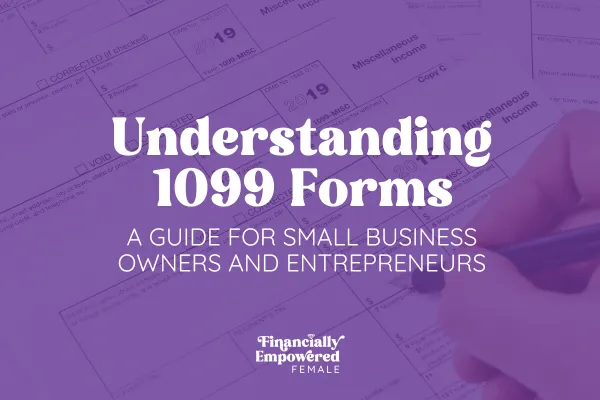OUR BLOG
Here we talk all things business and finance.
Check out our recent topics below!
Recent Blog Posts

Understanding 1099 Forms: A Guide for Small Business Owners and Entrepreneurs
“Today, it takes more brains and effort to make out the income-tax form than it does to make the income.” - ALFRED E. NEUMAN
Tax season can be daunting, especially for small business owners and entrepreneurs navigating the complexities of reporting income. One crucial aspect of tax compliance is understanding 1099 forms and their significance. We often get questions from clients about this particular tax form, so we created this guide to help you understand what 1099 forms are, who sends and receives them, why they're important for small business owners, when they should be sent out, and what each 1099 form is for. We hope this helps answer some of your questions!
What is a 1099 Form?
A 1099 form is a tax document used to report various types of income other than salaries, wages, and tips. It serves as a record of payments made by entities or individuals to recipients, providing important information for tax reporting purposes.
Who sends out 1099 Forms?
Individuals or entities who have paid at least $600 or more in specific categories are responsible for sending 1099 forms. These categories include:
Services: If you hired an independent contractor, freelancer, or other service provider for services equal to or more than $600.
Rent: If you paid more than $600 or more in rent for things like office space, machinery, or equipment.
Prizes and Awards: If you awarded someone $600 or more in prizes or awards.
Royalties: If you paid $10 or more in royalties during the year.
Other Income: If you made payments to an attorney for legal services, regardless of the amount.
Who receives 1099 Forms?
Recipients of 1099 forms are individuals or entities who received income from sources other than their regular employers, and the income meets or exceeds the $600 threshold. This can include independent contractors, freelancers, landlords, and others who earned income from various sources throughout the year.
Why are 1099 Forms Important for Small Business Owners and Entrepreneurs?
For small business owners and entrepreneurs, understanding and complying with 1099 reporting requirements are essential for several reasons:
1. Tax Compliance
Failing to issue 1099 forms when required can result in penalties and fines from the IRS. By staying compliant with 1099 reporting rules, small business owners can avoid costly consequences.
2. Avoiding Audit Triggers
Inconsistencies or discrepancies in tax reporting, such as failing to issue 1099 forms when required, can raise red flags during IRS audits. By proactively complying with 1099 reporting requirements, small business owners can reduce the risk of triggering audits and ensure smoother tax filing processes.
3. Tracking Expenses
Issuing 1099 forms helps small business owners accurately track their expenses and deductions. It provides a clear record of payments made to contractors, freelancers, and other service providers, which can be deducted as business expenses when filing taxes.
4. Building Relationships
Issuing 1099 forms in a timely and accurate manner demonstrates professionalism and transparency in business relationships. It helps maintain trust and credibility with vendors, contractors, and other stakeholders, fostering positive long-term relationships.
Types of 1099 Forms and Their Purposes
1099-A (Acquisition or Abandonment of Secured Property):
This form is used to report the acquisition or abandonment of secured property, such as in the case of mortgage debt forgiveness or short sales of property.
1099-B (Proceeds from Broker and Barter Exchange Transactions):
This form covers income from the sale of securities and certain types of bartering transactions (typically websites).
1099-C (Cancellation of Debt):
Issued by lenders, this form reports canceled debt that may be considered taxable income.
1099-DIV (Dividends and Distributions):
This form reports dividends and other distributions received from investments.
1099-G (Certain Government Payments):
If you received money from the government, such as tax refunds or unemployment compensation, you may receive this form.
1099-INT (Interest Income):
This form reports interest income earned from various sources, such as bank accounts and investments. If you earned $10 or more from interest, you will receive this form.
1099-K (Payment Card and Third Party Network Transactions):
If you received payments for goods or services via credit card or third-party payment systems, such as Venmo or Cash App, you may receive this form.
NOTE: A new threshold of $5,000 is planned to phase in for the 2024 tax year.
1099-MISC (Miscellaneous Income):
This catch-all form reports various types of income that don’t fit into other 1099 categories, such as prizes and awards.
1099-NEC (Nonemployee Compensation):
Introduced in 2020, this form specifically reports nonemployee compensation, such as payments to independent contractors or freelancers for services rendered.
1099-R (Distributions from Retirement Plans):
This form reports distributions from retirement plans, pensions, and annuities.
When Should You Send Out 1099 Forms?
1099 forms are typically sent out by the end of January, giving recipients ample time to use the information for their own tax filings. It's essential for small business owners to adhere to the deadlines and ensure that all required 1099 forms are issued accurately and promptly. Business owners can be proactive, or prepare in advance for the end of year (“1099 season”), by requesting W-9s from vendors prior to making any payment over $600.
In conclusion, 1099 forms play a vital role in tax reporting for small business owners and entrepreneurs. By understanding the purpose of 1099 forms, staying compliant with reporting requirements, and recognizing their importance in maintaining financial transparency and tax compliance, small business owners can navigate tax season with confidence and peace of mind.
DISCLAIMER:
All content and information on this website including our programs, products and/or services is for informational and educational purposes only, does not constitute accounting advice and does not establish any kind of accounting-client relationship by your use of this website. You should consult your own tax, legal and accounting advisors before engaging in any transaction.
© Copyright 2026 Financially Empowered Female




